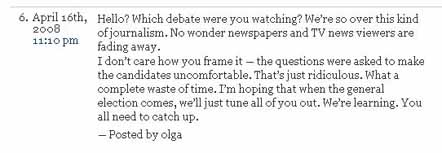Breaking the Progressive Comment Response Addiction
This week’s Democratic debate caused a fury on the Internet.
During the first 45 minutes, the moderators (Stephanopoulos and Gibson) covered Obama’s “bitter” comments, the Reverend Wright, flag pins on lapels, Hillary’s lying about Bosnia sniper fire, and Obama’s relationship to William Ayers.
You would hardly know we were a country in a recession fighting a war in Iraq.
The blogosphere has hashed this topic to death, however, so I will not comment on the issue itself anymore.
What I would like to address, however, is our progressive reaction to this event.
- Almost 700 comments were posted to this ABC news article
- Over 1200 comments were posted to Stephanopoulos’ profile at ABC
- Over 600 comments were placed on David Brooks article “No Whining About the Media” in the NY Times before they turned off comments about 10 hours after the article appeared
And these are just a few statistics. One count I read, said the ABC news site had 7000 posted comments after the debate.
My first thought reaction to this was: “Wow. This is great. Here was an event so obviously biased and trivial that it stood out like a flare.” I think the event may have even helped Obama and Democrats because he weathered the storm and called it for what it was, “gotcha politics.”
Then I thought about it from the perspective of the media. Apparently, this event had the highest ratings of a debate this season. ABC touted it as “easily the most watched of the 2008 presidential cycle.”
Similarly, I believe because of this controversy, readership for pundits like Howard Kurtz at the Washington Post and David Brooks at the NY Times is up.

As progressives, I know we have this tendency to believe that if we post a comment to David Brooks’ article, somehow this will get through to him and he will change his mind. Similarly with commenting on the ABC website. But the incentive is actually the opposite. Why would he write anything different when he gets MORE hits and MORE traffic from being controversial?
I believe, ironically, that this is an area where progressive values actually contribute to the fame of some of the pundit “entertainment” commentators.
In a market economy, the way to most effectively get rid of these commentators is to ignore them. Don’t read their articles. You’re only giving them more web hits so they can brag to their bosses about their high readership.
Think of it this way. Not only are these columnists getting the readership of their core conservative audience, but they are also getting liberals who disagree with them to read their articles and comment on them.
This realization came to me while reading about the debate backlash on Wednesday night.
But it is hard. It is like giving up smoking. You have to “not do” something you are used to doing. You have to instead think of how the media is incentivized.
Maybe it’s easier to think of it this way, we should support the kind of journalism that we believe in. Leave kind remarks on good articles. Send them to your friends.
Now I’m not arguing that we should stop trying to express our values about an objective media. But I think we need to remember what drives the pundits. Readership. That’s the number one criteria. Like it or not.
So we should spend more energy to support good journalism then on leaving remarks at pundit websites. Remember, if you’re reading to comment and disagree with the pundit, you are only driving up their web traffic.
Instead, here are three things you can do that are a more effective use of energy:
- Write a letter to the editor of your local paper – if published this may help get your point across without supporting a pundit you don’t agree with
- Support objective media – Read and comment on journalists who “do the right thing”; write letters to networks praising objective journalism; support alternative media
- Contribute to an organization like Media Matters or look for other tips online











2 Comments